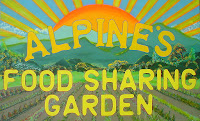Some of you have been receiving news of the Sharing Gardens since we
began in April 2009. Others of you have joined us along the way. This
post is a reminder of what makes our community gardens unique, as well
as offering thanks to some of the people and organizations who help make
the gardens thrive.
Alpine and Monroe's Sharing Gardens are a unique model of Community Garden. Instead of
many separate plots that are rented by individuals, these gardens are
one large plot,
shared by all. All materials and labor are donated. The food we grow is
shared amongst those who have contributed in some way as well as with others
who are in need in our community. All surplus is donated to our local
food-bank and other local food charities. No one is ever charged money for the food that is grown.
Remember the story of "Stone Soup"? A couple of strangers wander into a
town of suspicious people and offer to make Stone Soup. No one believes
it can be done, and everyone withholds contributing until a small child,
who hasn't been tainted yet by the town's stingy spirit, brings forth a
few onions stored in her family's root cellar. One by one the
townspeople get caught up in the spirit of sharing and, by the end of
the story they all sit down to delicious soup, made better by what each
of them contributed.
 |
| Cathy Rose, Danielle and Llyn - 2010 with bouquets of kale. |
The Sharing Gardens are a lot like Stone Soup. Everything that goes into
making it a success comes from the generosity of people near and far.
Some people give time, some give money and some bring us surplus
materials they don't have need of, or even things like grass clippings,
old cedar boards or other things bound for the dump or burn-pile. The
gardens become a focal point for giving
and receiving -- with
each person who donates being blessed with the good feeling that they
are making the world a better place through their contributions. And,
for those local enough to partake, they're sharing in the bounty of the
garden's beautiful harvest as well.
|
|
| Local kids help with the harvest. |
Each week brings new
surprises in support and generosity and there are also on-going
supporters who help make the garden's success possible.
Most recently we have some new, specific people to thank:
Bob and Cheryl Ballard brought us a dozen
full bags of
dried grass clippings - great for mulching the potatoes and putting
under the burgeoning winter squash so they don't develop rotten spots.
Judy Todd has made a
second cash donation.
We are grateful for our ongoing
community of volunteers. People
help out in the ways they are able; we find tasks to suit everyone's
abilities. If you'd like to join in the fun of gardening without use of
herbicides and pesticides, and share in the harvest,
here is a link that shows our regular volunteer times, or send us an email and we can add you to the list to receive weekly reminders.
It's been awhile since we thanked our
on-going supporters. These are people and organizations that help make the gardens possible:
Chester Crowson - owns the land where we have the Monroe site. He
lets us use it for free as well as covering the cost of the electricity
to run the pump in the well.
Bud Hardin - made a lump-sum donation to cover the cost of a portable toilet at the Monroe garden site
for a whole year! The toilet is shared with the Monroe Food Bank volunteers as well. (And thanks to
Guy Urbach for approaching Bud on our behalf - it wouldn't have happened without you!)
Best Pots - is the local portable toilet service that provides a
unit at the Monroe garden. They have given us a generous discount on
the rental fee.
 |
| Weekly harvest - Alpine 2010 |
Mylrea Estell and Ray Kreth - our landlords - continue to
harbor us in a low-pressure and generous arrangement, making it possible
for us to volunteer so much of our time to the gardens.
Alpine Community Center - has umbrellaed us under their insurance policy so the activities at both garden sites are covered.
Alpine Chapel Park - has provided us the site for our Alpine Garden free of charge, since 2009.
Alpine Pump - Dorothy and Gary give us permission to put the gardens' trash into their dumpster.
Jennifer Rivais - empties the garbage cans at Alpine's Chapel Park as an on-going service.
...and
The Tribune News - our great, local, weekly paper has
been very helpful in printing many of our posts and helping us circulate
news of the gardens to a much larger audience than we can reach
on-line.
If you've been itching to get involved in some way and would like to
know how you can add your "onions" to the pot, check out our Wish List
below, or come down on one of the volunteer days and share in the "stone
soup" garden.
Here is our current wishlist
Garden locations and volunteer times
 |
| Happy pumpkin picker - 2010 |























































